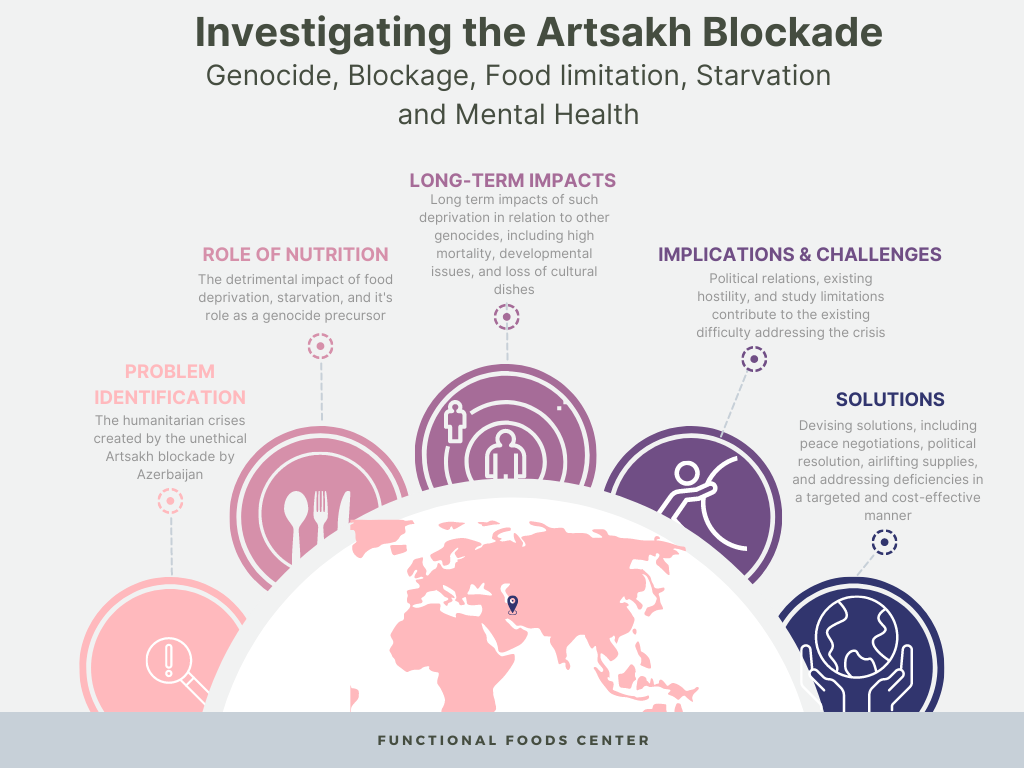The Impact of Food Deprivation and Starvation on Mental Health: Blockade on Artsakh (Nagorno - Karabakh)
DOI:
https://doi.org/10.31989/ffs.v3i8.1204Abstract
Starvation is the deliberate deprivation of food that occurs when perpetrators impede the victims from accessing the necessities to sustain life. Throughout history, starvation had been utilized as a form of genocide by many past regimes. It is used as a method to enforce a surrender from the victim or as a military strategy during warfare. Genocide, one of the most devasting crimes against humanity, as defined by Rafael Lempkin and categorized by the United Nations Genocide Convention, is the deliberate attempt to annihilate a certain ethnic, religious, or social group of people. The purpose of this article is to examine the immediate and lasting effects of the cognitive, psychological, and mental aspects of starvation.
In this current blockade of Artsakh, a dispute arises in the Artsakh region, also known as the Nagorno-Karabakh region, between Azerbaijan and the Republic (unrecognized) of Artsakh. Since December 12, 2022, ecologists from Azerbaijan have blocked the Berdzor (Lachin) Corridor, the only route that linked Artsakh to the world, thus preventing the transportation of fuel, medicine, and food. Russian peacekeepers have been stationed at the Corridor in Artsakh; however, the Azerbaijan government has consolidated its blockade and has disregarded the appeals made by the Russian peacekeepers.
In this article, the effects of starvation on the cognitive, psychological, and mental functioning of the human body are presented as they related to historical genocide. The impacts of starvation and malnutrition can be highly detrimental, leading to long-lasting impacts, and can disrupt the balance of essential nutrients and neurotransmitters in the brain, such as serotonin and dopamine. Malnourishment also impairs cognitive function, leading to symptoms like
fatigue, weakness, irritation, poor memory, and attention deficit. Fluctuating blood sugar levels and imbalanced hormones caused by starvation impact emotional regulation and increase the risk of developing mood disorders. The blockade of Artsakh could potentially cause both severe short term and long-term damage to the mental health of the victims. Since the blockade occurred more than 250 days ago, detrimental damages have already occurred. This article strongly calls upon the international community to take immediate action against this blockade and help prevent future genocide.

Keywords: Starvation, Genocide, Artsakh (Nagorno-Karabakh), blockade, Lachin corridor, bioactive compound, functional foods
Downloads
Published
Issue
Section
License
Copyright (c) 2023 FFS/Functional Food Science

This work is licensed under a Creative Commons Attribution-NonCommercial 4.0 International License.
Authors retain the copyright of their articles and grant the Functional Food Center (FFC) and its journals the right of first publication under the terms of the Creative Commons Attribution 4.0 International License.
This license permits unrestricted use, distribution, and reproduction in any medium, including commercial use, provided the original author(s) and source are properly credited. Authors may post and share their published work freely, provided that the original publication in this journal is acknowledged.
By submitting to this journal, authors confirm that their manuscripts are original, not under consideration elsewhere, and that they hold the necessary rights to grant this license. The Functional Food Center encourages open scientific exchange and allows derivative and extended works, provided attribution to the original publication is maintained.